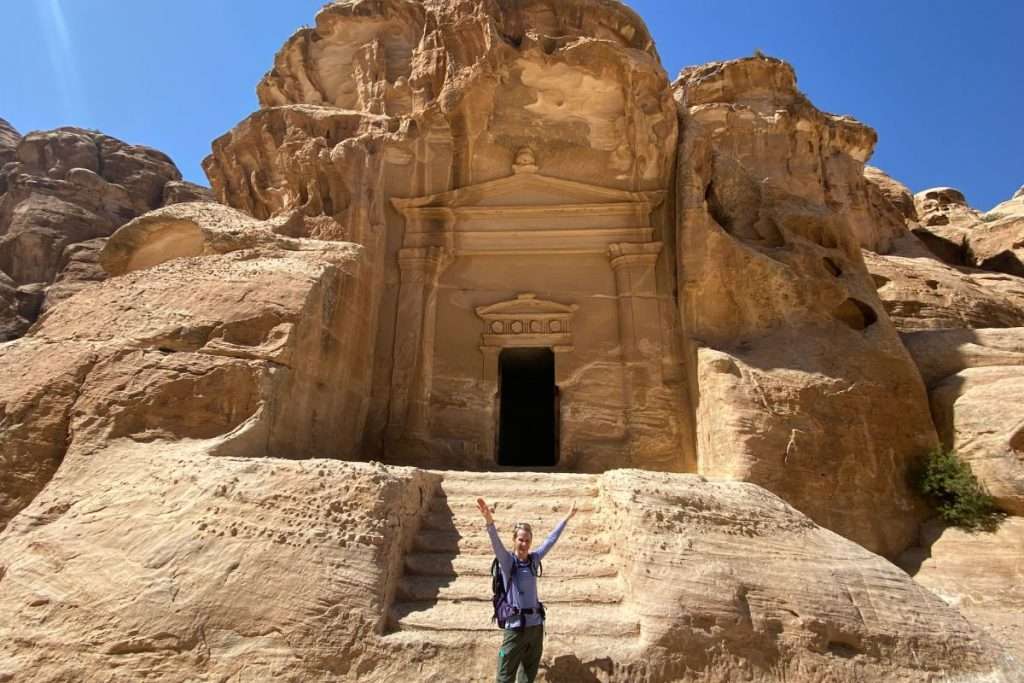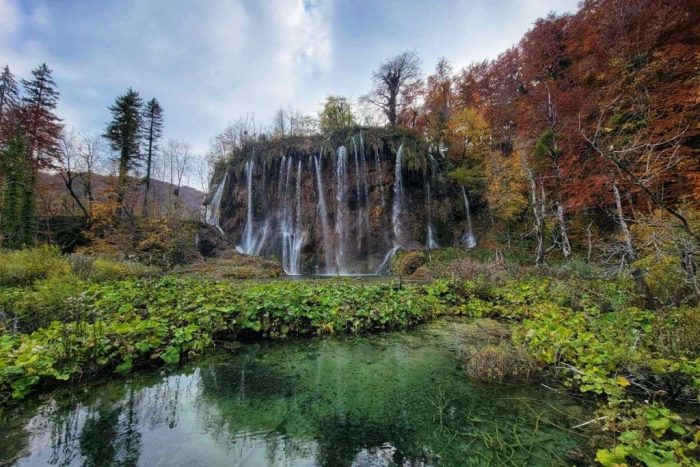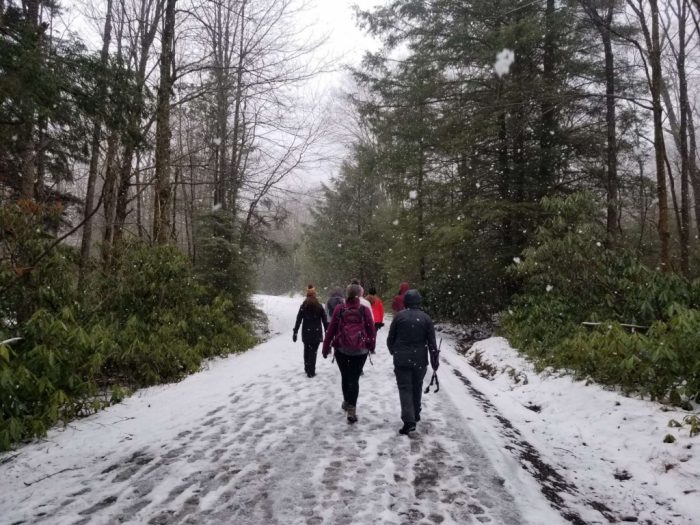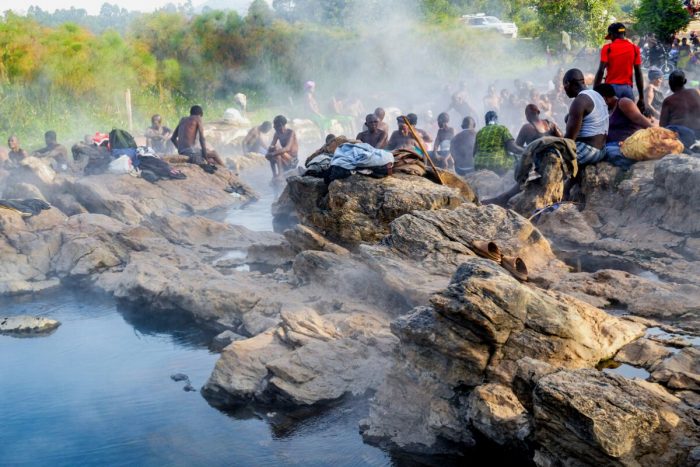The Lost City of Petra: Explore Its Ancient Beauty
The ancient city of Petra is one of the New Seven Wonders of the World, known for stunning architecture surrounding fascinating ruins giving insight into the ancient world of modern-day Jordan. You might recognize one or two places from Hollywood classics like Indiana Jones and The Mummy Returns, but there’s a heck of a lot more to this ancient city than being a former film set!
Traveling to the Middle East can feel like a big undertaking, and there’s SO much to consider when planning overseas travel to immerse yourself in different cultures. Safety, transportation, and squeezing in maximum fun? Rest assured, Explore Chick has got your back!
Keep reading for everything you need to know about traveling to Jordan and visiting the ancient lost city, and every incredible site you can’t miss!
The Epic History of the Lost City of Petra
Ancient Petra was carved from sandstone by the semi-nomadic Nabataean culture, and remained the capital city of the Nabataean kingdom for 500 years between 400 B.C. and 106 A.D. After successfully fighting off an invasion from the Greek Empire, Petra eventually fell to the powerful Romans. Nestled among the rugged desert canyons of modern-day Southwestern Jordan, the “Rose City” (named for the color of the stone it’s carved from) was once a thriving empire and a center for trade.
After a major earthquake during the fourth century destroyed many buildings in the ancient city, the Romans largely abandoned Petra. This created room for the Byzantine period, during which the empire controlled the Petra area for several centuries. The surviving structures of Petra served as shelter for nomadic shepherds for hundreds of years after the trade-centered city was gradually abandoned.
When Swiss explorer Johann Ludwig Burckhardt discovered the lost city of Petra in 1812, his findings drew attention from geologists and archeologists around the world.
After Petra began to draw the attention of the Western world, British archeologists began excavating the site in 1929. In the near century since, dozens of discoveries among the ancient ruins have been unveiled. Petra has more royal tombs than the Valley of the Kings in Luxor, Egypt–the burial ground for well-known pharaohs such as Tutankhamun, Seti I, and Ramses II.
Best Things To Do & See At Petra
Since 1985 the ancient city of Petra has been a UNESCO World Heritage site and remains one of the most popular attractions in Jordan. You haven’t lived in a true, ancient sense until you’ve visited Petra.

Here are some of the most exciting sites in the Lost City of Petra:
- Obelisk Tomb
- Bab Al-Siq
- Street of Facades
- The Royal Tombs
- Theater of Petra
- Al Khazneh Treasury
- The Great Temple
The Best Sites in the Lost City of Petra
Here’s everything you need to know about Petra’s most stunning sites:


Obelisk Tomb
The Obelisk Tomb was carved from the rugged rock faces of Petra roughly 2,000 years ago. The ancient burial complex is two stories tall and is a unique blend of architecture from Nabataean, Greek, and Roman cultures. It’s one of few multi-story tombs in Petra, and serves as the final resting place for a family of five.
You can visit Obelisk Tomb along your route after you finish the walk through the main entrance in Wadi Musa, Jordan.
Street of Facades
The Street of Facades is a section of the canyon at Petra leading from the Treasury to the center of the city and the Theater of Petra, notably lined by towering sandstone walls and impressive tombs with delicately carved false faces. Dozens of smaller tombs for the not-so-wealthy inhabitants of the lost city can be seen along the lower walls as well.

The house caves on the Street of Facades are some of the best up-close exploring in Petra. You can scramble yourself up the mountainside and enter a subterraneous passage leading to networks of sandstone caves.
The Royal Tombs
Elevated above the ancient city center are the majestic Royal Tombs of Petra, a series of large vaults. There’s not enough archeological evidence to confirm it definitively, but it’s thought that this may be the tomb of Malichus II, a Nabataean King who died around 70 A.D. Some carvings found in the excavated mausoleum suggest the stone structures here may have been converted to a church some 400 years later.
To reach the Royal Tombs you’ll climb a set of stairs that lead first to the Urn Tomb, used by the Byzantines as a place of worship. Continue on to the Silk Tomb, the Palace Tomb, the Corinthian Tomb, and the Tomb of Sesto Fiorentino.
Theater of Petra
Roman influence on the city of Petra is clear when looking at the astounding Theater of Petra. The rounded walls and stacked rows able to seat over 8,000 individuals follow similar architectural patterns to Roman structures like the Colosseum.

Most of the theater was carved from solid rock and some of the walls were constructed one block of stone at a time. The impressive structure astounds most visitors, and confirms that Petra was a city that celebrated arts and culture.
The Bab Al-Siq
As you travel the path from the Petra Visitor Center in the town of Wadi Musa and the main entrance to the ancient city, the Bab Al Siq or “gateway to to siq” is the main entrance to Petra, situated between a deep, rocky gorge with sides carved and squared out of the rock. It’s theorized the canyon was formed by flood waters rushing from what is now Wadi Musa into what became Petra.



The siq is the beginning of the main road that leads to the city, giving you the extraordinary impression that you’re about to embark on a pretty incredible adventure. As you journey through the canyon you’ll find inscriptions giving a glimpse into the history of the ancient capital, caves and tombs carved out of rock cliffs, and buildings erected over 2,000 years ago.
Al Khazneh, “The Treasury”
One of the most elaborate ancient temples in all of Jordan, Petra’s Al Khazneh or “the Treasury” is carved from the same gorgeous sandstone classic to the lost city. It’s theorized that it could be the tomb for the Nabatean King Aretas IV. Visitors aren’t able to enter the chamber, and it’s said to be completely empty anyway, but the namesake for the structure came in the early 19th century when nomads believed that it did contain treasure of ancient kings.

Many of the fine details of the mausoleum have faded and worn over the centuries since it was sculpted from the cliffs, but the structure is still iconic. This is one you’ll recognize from the movies, baby.
The Great Temple
The monumental structure known as the Great Temple of Petra lies south of Colonnaded Street, where an ancient staircase leads to an open courtyard carved from the stone nearly 25,000 square feet. The towering pillars in hues of rose and orange tower above you as you walk among the ancient Byzantine place of worship.
Admire the still visible mosaic floors, admire the intricate rock-cut formations, then look up and gaze at the surrounding mountains that form the eastern side of the Arabah Mountain Range.




Common Questions About Petra
The holy grail of ancient cities, Petra is renowned world-wide and carefully protected, but well worth the trek for anyone visiting Jordan.
Yes! You can walk into the Lost City of Petra from the Petra Visitor Center in Wadi Musa. The trail from there to the Treasury, one of Petra’s iconic highlights, is only about one mile and doesn’t take nearly half an hour for most. From there you can continue another mile to see more of Petra’s stunning sites. There are currently no restrictions or travel warnings on visiting Petra!
Inside the city of Petra is a maze of thousand year old archeological marvels. Structures here are ranging from Nabataean amphitheaters inspired by the ancient Romans, buildings carved from rose colored sandstone, and ancient Greek temples all seeping with history and wonder.
Ready to Experience Jordan?
How can the stunning desert gems of Jordan NOT be calling your name by now? Time to find a group of adventure troopers who are just as eager to explore ancient ruins!
On our 8-day Ultimate Jordan and Petra Tour, your expert Explorer Chick guides will usher you through hiking, glamping, canyon exploring, Dead Sea swimming, and more! Did we mention the Jeep Safari Tour? Yeah, our Jordan adventure is jam-packed with stoke.
Let us do the planning and take care of every detail, from accommodations to eats–we’ve got your back so you can relax and get chummy with your new travel buds.
Meet the Writer

April Brightman
April is an adventure lover and freelance writer based in New England, with a passion for public lands, wild places, and all things outdoors. She loves camping in any form and spends as many weekends as she can hiking New Hampshire’s highest peaks, or road-tripping with her sweet dog Marley. If not in the mountains, you can find her planning her next expedition or caring for one of her far-too-many-houseplants.
Favorite outdoor adventure: National Parks Hiking and Road Trips!








